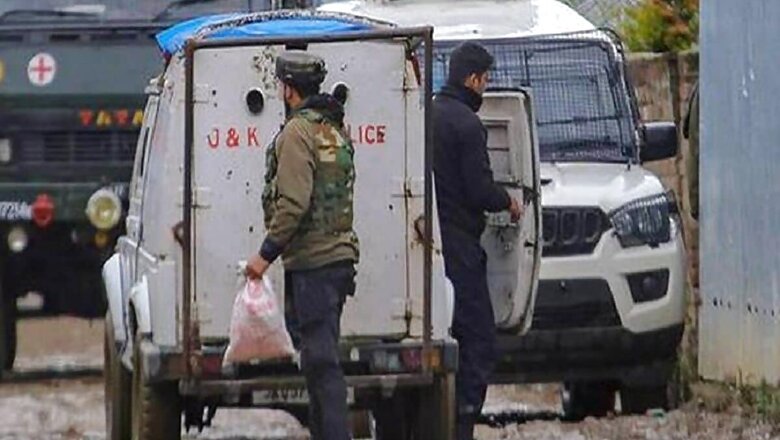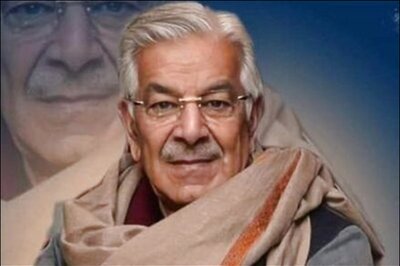
views
Four months after police in Kashmir initiated a request for the extradition of an alleged United Arab Emirates-based jihad propagandist who has issued multiple online calls for violence against both officials and civilians, paperwork necessary to secure his return to face trial in India has not been processed at the Union Territory’s Police Headquarters, documents obtained by News18 have revealed.
Kashmir’s inspector general of police Vijay Kumar had, documents obtained by News18 show, written to the headquarters on September 9, 2020, seeking the extradition of one-time Pampore resident Asif Maqbool Dar, who runs multiple social media platforms popular among secessionist audiences.
Kumar’s extradition request noted that a non-bailable warrant had been issued against Dar, who is sought for prosecution under Section 13 of the Unlawful Activities Prevention Act, providing for the punishment for any individual who “advocates, abets, advises or incites the commission of any unlawful activity”.
For the extradition process to move forward, government sources in New Delhi said, the request must be forwarded to the union ministry of home affairs and then on to the ministry of external affairs.
The file, sources in the Jammu and Kashmir Police say, has however remained pending, without explanation, at the office of the inspector general of police for crime, intelligence and vigilance, Alok Kumar.
Director general of police Dilbag Singh did not respond to a request for comment from News18. However, on January 6— the same date as News18’s request for comment— Police Headquarters wrote back to the Inspector General of Police’s office, asking for the extradition request to be resubmitted in a format prescribed by the Union Ministry of Home Affairs.
Last week, a fresh first information report was filed by police against Dar at the Kothibagh police station in Srinagar, under Section 13 of UAPA, as well as for incitement to communal hatred.
In a succession of rambling videos, Dar has called on Kashmiris to rise up against what he describes as India’s “militarist occupation”, support jihadists, and to ostracise the families of officials and others he calls murtad, or apostates. “I am admittedly a racist,” he states in one video. “I am racist against every Indian.”
Kashmir Police sources told News18 that Dar, who earlier worked as a doctor in Dammam, Saudi Arabia, had moved in recent weeks to Ras al-Khaimah in the UAE.
“India has an excellent counter-terrorism relationship with the UAE and there’s every chance we’ll be able to extradite Dar to face trial, or to secure his deportation,” a New Delhi-based intelligence official said. “Both Saudi Arabia and the UAE have cooperated with us in dozens of recent cases. That said, their assistance can only be offered once the file makes its way from Jammu and Kashmir to New Delhi.”
Like other governments across the world, India seeks the return of fugitives from justice through extradition or legal assistance treaties, which require the submission of a warrant from a court, and credible evidence that a crime has been committed.
Intelligence services in countries like Saudi Arabia and the UAE, though, sometimes respond to evidence submitted by India’s Research and Analysis Wing by simply deporting suspects—allowing police to arrest them on their return.
Following the revocation of Article 370 clauses in 2019, the Jammu and Kashmir Police had begun an aggressive crackdown on the use of social media—critical to the massive, Islamist-led mobilisation which swept aside Indian state power in 2016. Key online activists were, controversially, threatened with prosecution for postings the authorities argued were inflammatory.
Investigations, however, led authorities to the conclusion that critical figures in the secessionist online campaign were living overseas. Efforts against these networks led, among other things, to the deportation from the UAE of Shaukat Ahmad Dar—who, using the pseudonymous social media handle ‘Hamza Hizbi’, had threatened officials with execution-style killings.
In other cases—notably that of Srinagar resident Sajjad Gul and Sopore resident Rayees Mir, accused of issuing the online calls that led to the assassination of journalist Shujaat Bukhari—the suspects could not be deported, since they had fled to Pakistan.
“The real concern with delays like the one we’ve seen in the Dar case,” the intelligence official said, “is that it allows perpetrators time to escape to countries from where we cannot seek their return.”
Intelligence sources said Pakistan’s spy services worked systematically from 2008 to amplify secessionist voices, setting up hundreds of thousands of mutually reinforcing fake handles on Facebook and Twitter—a common strategy of modern political propagandists.
Lacking a credible leadership within Kashmir itself, police sources told News18, the secessionist movement has now become increasingly dependent on loosely organised circles of online activists based in Europe, Turkey and the Persian Gulf states.
The more influential secessionist voices in the diaspora include Nazir Shawl, a former academic who runs an activist centre based in London, United States-based architect Aziz ‘Tony’ Ashai, Australia-based businessman Mubeen Shah and ailing Islamist leader Syed Ali Shah Geelani’s Istanbul-based granddaughter Ruwa Shah.
“In some of these cases, the individuals concerned are protected by the free-speech laws of the countries they live in, and you could argue what they say constitutes legitimate political opinion,” said a Kashmir-based government official familiar with the Dar case. “There are other cases involving express calls to violence, often targeting individuals or glorifying jihadists, which are crimes by most countries’ standards.”
Read all the Latest News, Breaking News and Coronavirus News here

















Comments
0 comment